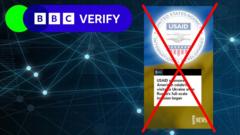A video claiming that the US Agency for International Development (USAID) financially compensated Hollywood stars for their visits to Ukraine has rapidly spread across social media platforms, gaining traction through prominent figures like Elon Musk. Despite its viral status, the authenticity of this clip is highly questionable, with expert analysis indicating it aligns with patterns commonly associated with disinformation efforts.
BBC Verify's Olga Robinson has highlighted that the video bears the characteristics of a Russian disinformation campaign that has previously been scrutinized by credible investigative outlets. This misleading content raises concerns over the manipulation of public perception regarding USAID's activities and the ongoing situation in Ukraine.
As the prevalence of misinformation online continues to escalate, this incident underscores the critical need for digital literacy and vigilant fact-checking. While the clip succeeds at capturing attention and stirring conversations, it ultimately reflects a troubling trend where fabricated narratives can distort reality and influence public opinion.
The potential ramifications of such disinformation tactics are far-reaching, especially in geopolitical contexts where narratives can shape international relations and aid perceptions. It is essential for audiences to remain discerning and to rely on well-established news sources when evaluating claims that could significantly impact real-world events.


















